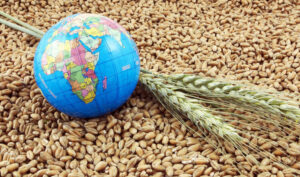
As of March 5, Ukraine exported 29.68 mln tonnes of grains and pulses since the beginning of 2024-2025 marketing year (MY, July-2024 – June-2025), of which 490 thsd tonnes were shipped this month, the press service of the Ministry of Agrarian Policy and Food reported, citing the State Customs Service.
According to the report, as of March 8 last year, the total shipments amounted to 30.989 mln tonnes, including 1.319 mln tonnes in March.
At the same time, since the beginning of the current season, Ukraine has exported 12.155 mln tonnes of wheat (12.375 mln tonnes in 2023/24 MY), 2.126 mln tonnes of barley (1.761 mln tonnes), 10.8 thsd tonnes of rye (1 thsd tonnes), and 14.924 mln tonnes of corn (16.569 mln tonnes).
The total export of Ukrainian flour since the beginning of the season as of March 5 is estimated at 49 thsd tonnes (in 2023/24 MY – 74.9 thsd tonnes), including 45.2 thsd tonnes of wheat (71.1 thsd tonnes).
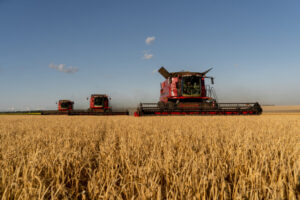
Ukraine is a strategic partner of the EU and the world. While a significant part of the world’s land is becoming unsuitable for agriculture due to climate change and soil degradation, in Ukraine, with a total area of 60.35 million hectares, 42.73 million hectares or 70.8% of the territory is already used in agricultural production, according to SEEDS.
Dmytro Ustavytskyi, co-founder of the logistics company NIDERA AGRO, an expert in international logistics and innovative solutions, and industry leader of the NGO Svit.UA, writes about this in a blog on the Svit.UA website.
“Despite the realities of the war, grain exports from Ukraine are crucial for the food security of the world. This month, the EU is presenting the updated Common Agricultural Policy of the European Union, which will be adopted in 2028. Currently, it is being discussed that trade preferences introduced in 2022 due to the war should be extended until 2027, as the war continues.
According to the Ministry of Agriculture, in 2024, exports of agricultural products brought in $24.6 billion, which is 59% of the country’s total exports. Ukrainian farmers managed to increase exports by 12.5% compared to 2023. Sales of grains (+1.1 billion USD) and oilseeds (+0.5 billion USD) increased the most,” says Dmytro Ustavytskyi.
In his opinion, logistics in the agricultural sector of Ukraine plays a crucial role in ensuring food security both domestically and in foreign markets.
“Logistics covers the entire supply chain – from the delivery of seeds, fertilizers and machinery to producers to the transportation of crops to storage, processing, domestic markets and export terminals. Efficient logistics helps to minimize crop losses, preserve its quality and ensure competitive prices,” adds the expert on international logistics and innovative solutions.
Challenges of war: infrastructure losses and risks
Russia’s full-scale invasion has shown the critical importance of stable logistics. The destruction of transport infrastructure, blocking of sea routes, destruction of elevators and mining of agricultural land have complicated agricultural processes. However, Ukraine was able to adapt by expanding export routes through the Danube ports and alternative land corridors to the EU.
Export potential: opportunities and constraints
The European Union remains Ukraine’s main trading partner. Ukrainian grain helps to reduce food inflation in the EU.
“However, neighboring countries view the Ukrainian agricultural sector not only as a partner but also as a competitor, which makes it difficult to enter new European markets. Therefore, the issue of extending trade benefits for exporters and solving the problems of blocking borders is a priority.
Ukraine has significant export potential because of its high quality products. For example, the President of the Ukrainian Grain Association (UGA) conducted an audit in the EU and received positive feedback on the quality of Ukrainian grain, which is recognized as one of the best in Europe,” recalls Dmytro Ustavytskyi.
How medium-sized farmers can enter EU markets
“Ukrainian farmers now have the opportunity to sell grain to the EU without customs barriers. For example, a farmer with 500 hectares of land can supply products directly to processors in Italy. And now Ukrainian grain can reach San Martino in Italy in just 2 weeks!
Currently, 90% of Ukrainian grain (wheat and corn) is supplied to Italy, gradually displacing Russian products from the local market. This demonstrates the effectiveness of Ukrainian logistics, which is gradually integrating into the European infrastructure,” emphasizes the co-founder of the logistics company NIDERA AGRO.
Development of logistics infrastructure: the key to competitiveness
According to the expert, his team has now built a complete logistics chain for farmers:
“Today, farmers have a choice – to sell grain on the domestic market or to export on more favorable terms. Transparency of prices on trading platforms allows us to plan sales more efficiently, which reduces logistics costs,” adds Dmytro Ustavytskyi.
Financial opportunities for exporters
According to the expert in international logistics and innovative solutions, farmers have already learned how to work with foreign exchange contracts, which simplifies export operations. Banks have simplified the mechanism for servicing foreign currency accounts, which helps to avoid exchange rate risks.
“However, exports require certification and professional support. We help small producers to go through this process without risks by providing solutions for exporting consignments of 1,800 tons or more. Quality assurance is a key factor in successful exports,” says Dmytro Ustavytskyi.
Trade strategies and training for farmers
One of the common mistakes, the expert believes, is selling grain immediately after harvest, when prices are lowest. In his opinion, it is more profitable to store products and analyze the market to sell at the most favorable time.
In addition, further improvement of agro-logistics is impossible without investment in:
“At NGO Svit.UA, we are raising these issues and will be organizing meetings with the Ministry of Agrarian Policy to discuss the possibilities of state support for small and medium-sized farmers in entering international markets.
In times of war, export support for small and medium-sized farmers is becoming a strategically important area for food security and economic development.
Ukrainian producers remain important partners for the EU, so there must be a certain trade culture, because the main requirement of European buyers is honesty in terms of quality and quantity of products,” adds Dmytro Ustavytskyi.
In his opinion, Ukraine has unique opportunities to integrate into the European market even despite the challenges of war. Investments in logistics, digital solutions and international cooperation will help make this process efficient and profitable for Ukrainian farmers.
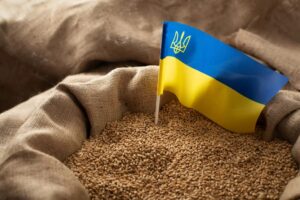
As of February 28, Ukraine exported 28.853 mln tonnes of grains and pulses since the beginning of 2024/25 marketing year (MY, July 2024 – June 2025), of which 3.162 mln tonnes were shipped this month, the press service of the Ministry of Agrarian Policy and Food reported, citing the data of the State Customs Service.
According to the report, as of the same date last year, the total shipments amounted to 29.136 mln tonnes, including 5.26 mln tonnes in February-2024.
At the same time, since the beginning of the current season, Ukraine has exported 11.883 mln tonnes of wheat (11.449 mln tonnes in 2023/24 MY), 2.124 mln tonnes of barley (1.597 mln tonnes), 10.8 thsd tonnes of rye (1 thsd tonnes), and 14.405 mln tonnes of corn (15.671 mln tonnes).
The total export of Ukrainian flour since the beginning of the season as of February 24 is estimated at 46.4 thsd tonnes (in 2023/24 MY – 73 thsd tonnes), including wheat – 42.9 thsd tonnes (69.3 thsd tonnes).
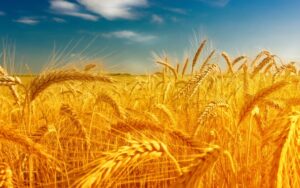
The total exports of grains and oilseeds from Ukraine in July-January of 2024/25 marketing year (MY) (July 2024-June 2025) are estimated at $11 billion, up 13.4% compared to $9.7 billion in the same period last year, the Ukrainian Grain Association (UGA) reported on Facebook.
According to the report, corn exports are leading in the group of grains, which in July-January of 2024/25 MY is estimated at $2.412 bln against $2.098 bln in the same period of the previous MY, wheat – $2.084 bln ($1.488 bln), barley – $350 mln ($212 mln).
At the same time, in the oilseeds segment, the shipments of soybeans and rapeseed increased to $909 mln ($718 mln) and $1.452 bln ($1.145 bln), respectively, while the exports of sunflower seeds decreased to $22 mln ($57 mln).
In the current season, Ukraine reduced exports of sunflower oil to $2.701 billion ($2.777 billion) and sunflower meal to $682 million ($774 million). Shipments of other vegetable oils decreased to $393 million ($438 million).
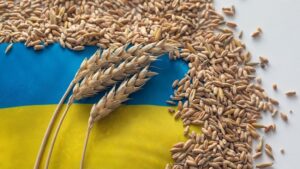
As of February 21, Ukraine exported 28.219 mln tonnes of grains and pulses since the beginning of 2024-2025 marketing year, of which 2.528 mln tonnes were shipped this month, the press service of the Ministry of Agrarian Policy and Food reported citing the State Customs Service.
According to the report, as of the same date last year, the total shipments amounted to 27.627 mln tons, including 3.751 mln tons in February.
In terms of crops, since the beginning of the current season, Ukraine has exported 11.714 mln tonnes of wheat (910 thsd tonnes in February), 2.113 mln tonnes of barley (49 thsd tonnes), 10.8 thsd tonnes of rye (0), and 13.954 mln tonnes of corn (1.561 mln tonnes).
The total export of Ukrainian flour since the beginning of the season as of February 21 is estimated at 46.4 thsd tonnes (2.9 thsd tonnes in February), including wheat – 42.9 thsd tonnes (2.8 thsd tonnes).
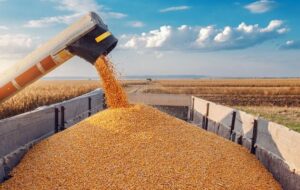
As of February 14, Ukraine exported 27.275 mln tonnes of grains and pulses since the beginning of 2024-2025 marketing year, of which 1.585 mln tonnes were shipped since the beginning of the current month, the press service of the Ministry of Agrarian Policy and Food reported, citing the State Customs Service.
According to the report, as of the same date last year, the total shipments amounted to 26.269 million tons, including 2.393 million tons in February.
In particular, since the beginning of the current season, Ukraine has exported 11.464 mln tonnes of wheat (10.14 mln tonnes in 2023/24 MY), 2.106 mln tonnes of barley (1.507 mln tonnes), 10.8 thsd tonnes of rye (1 thsd tonnes), and 13.27 mln tonnes of corn (14.355 mln tonnes).
The total export of Ukrainian flour since the beginning of the season as of February 14 is estimated at 45.5 thsd tonnes (in 2023/24 MY – 70.6 thsd tonnes), including wheat – 42 thsd tonnes (66.9 thsd tonnes).